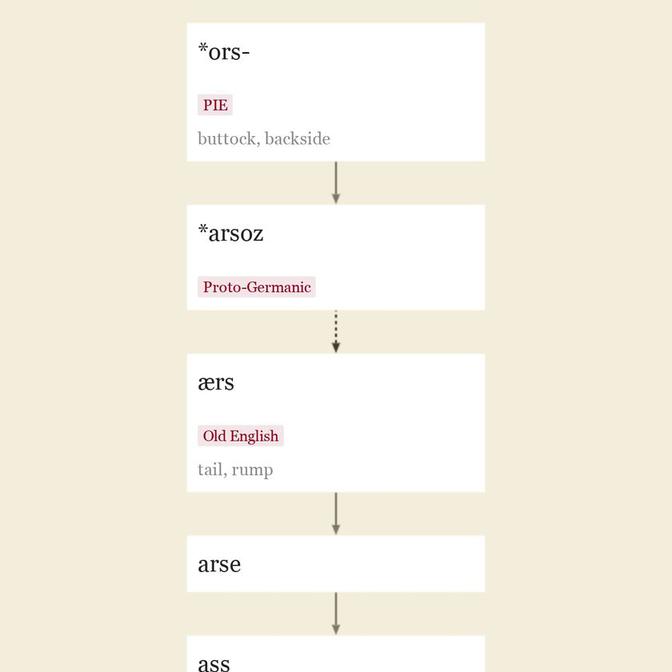hard-ass (adj.)
"坚韧、不妥协",1961年,来自 hard(形容词)+ ass(名词2)。可能最初是军事用语。作为名词,指"坚韧、不妥协的人",始于1967年。据说 Old Hard Ass 是乔治·A·卡斯特将军(1839-1876)在他的骑兵部队中的绰号,因为他似乎在马鞍上不知疲倦。
hard-ass 的相关词汇

“后面”,1860年在航海俚语中被证实,从1930年开始流行,主要在美国,来自方言变体发音 arse(参见)。在 -s- 之前失去 -r- 并不罕见(burst/bust, curse/cuss, horse/hoss, barse/bass, garsh/gash, parcel/passel)。
从17世纪开始,可以追溯到从 arse 到 ass 的变化的间接证据。到1680年代, arse 的发音已经与“-ass”单词押韵,如在“Sodom or the Quintessence of Debauchery”中:“I would advise you, sir, to make a pass/Once more at Pockenello's loyal arse.”如果尼克· Bottom 在“仲夏夜之梦”(1594)中变成驴子是一些人认为的文字游戏,那么这可能早在莎士比亚时代就出现了。
I must to the barber's, mounsieur; for me thinks I am marvellous hairy about the face; and I am such a tender ass, if my hair do but tickle me, I must scratch. [Bottom]
我必须去理发店,先生; 因为我觉得我的脸上有很多毛发; 而且我是这样一个娇嫩的驴,如果我的头发只是轻轻地挠我,我就必须挠一下。[Bottom]
到1785年,有礼貌的说话者避免使用“驴”的意思。
“将女人视为性对象”的含义早在1940年代初就已经出现(似乎在1930年代的提华纳圣经中暗示了 piece of ass),但这个形象更早(比较 buttock “一个普通的妓女”,1670年代)。到1969年,“have (one's) head up (one's) ass”“不知道自己在做什么”已经被证实。俚语 (one's) ass “自己,自己的人”在1958年被证实。到1946年,“work (one's) ass off”“非常努力地工作”; 到1972年,“laugh (one's) ass off”“非常大声地笑”(从1965年暗示)。( stick it) up your ass 誓言在1953年被证实; 明显的委婉语表明早期的使用:
He snoighed up his nose as if th' cheese stunk, eyed me wi an air o contempt fro my shoon to my yed, un deawn ogen fro my yed to my shoon ; un then pushin th' brade un cheese into my hont ogen, he says "Take your vile bread and cheese and stick it up your coat sleeve, and be demmed to you. Do you think I want your paltry grub?" Un then, turnin on his heel, he hurried into th' perk. ["Bobby Shuttle un His Woife Sayroh's Visit to Manchester," 1857]
他嗤之以鼻,好像奶酪发臭,从我的鞋到我的头,用轻蔑的眼神看着我,然后从我的头到我的鞋,再次把面包和奶酪推到我的手中,他说:“把你那肮脏的面包和奶酪塞进你的衣袖里,去见鬼吧。你以为我想要你那微不足道的食物吗?”然后,他转身走进了公园。[“Bobby Shuttle un His Woife Sayroh's Visit to Manchester”,1857]
古英语中的 heard 意为“坚固而坚硬,不柔软”,同时也指“难以忍受,需要极大努力”,还可用于形容人“严厉、严格、苛刻、残酷”。源自原始日耳曼语 *hardu-(也源自古撒克逊语 hard 、古弗里斯兰语 herd 、荷兰语 hard 、古诺尔斯语 harðr “坚硬”,古高地德语 harto “极其,非常”,德语 hart,哥特语 hardus “坚硬”),源自 PIE *kortu-,是词根 *kar- “坚硬”的带后缀形式。
“难以做到”的意思可追溯至公元1200年左右。1650年代开始用于指水中的矿物盐含量; 1775年开始用于指辅音。Hard of hearing 保留了中古英语中“做某事困难”的意义。1789年开始用于指“强壮的、有酒精的、发酵的”(如 hard cider 等),这个意义可能是 hard drugs(1955年)中的起源。Hard facts 始于1853年; hard news 在新闻业中始于1918年。Hard copy(与计算机记录相对)始于1964年; hard disk 始于1978年; 计算机 hard drive 始于1983年。Hard times “贫困时期”始于1705年。Hard money(1706年)指的是金银币,与纸币相对。因此,19世纪美国的 hard(名词)指的是“主张使用金属货币作为国家货币的人”(1844年)。play hard to get 始于1945年。Hard rock 指的是一种流行音乐风格,始于1967年。the hard way 始于1907年,表示“做某事困难”。